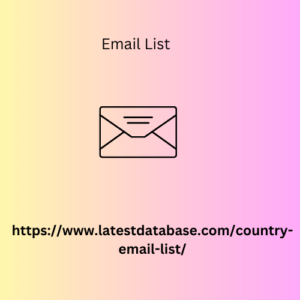In the dynamic world of real estate, success hinges on building strong relationships. A well-curated realtor contact database serves as a bridge, connecting you to potential clients, collaborators, and valuable industry resources. This article explores the benefits of using a realtor contact database, guides you through the process of building one, and offers strategies to make it a powerful tool for boosting your real estate career.
Beyond Business Cards: Why Use a Realtor Contact Database?
While traditional methods like collecting Turks and Caicos Islands Email List business cards might seem sufficient for a limited network, a realtor contact database offers significant advantages:
- Centralized Storage: Consolidate contact information from various sources (business cards, conferences, online directories) into a single, accessible location. No more scrambling to find that crucial contact you met at a networking event.
- Enhanced Organization: Categorize your contacts by role (buyers, sellers, investors), location, or any criteria that suits your needs. This allows for efficient searching and filtering when seeking specific individuals or expertise.
- Detailed Information Storage: Store additional information beyond basic contact details. Consider including property preferences for potential buyer contacts, investment interests for investors, or even past referrals or successful collaborations.
- Accessibility and Convenience: Access your contact database from any device with an internet connection – whether you’re at your desk, showing a property, or attending an industry meeting.
- Data Analysis and Insights: Some database platforms offer reporting functionalities, allowing you to analyze your network, identify potential client segments, or track referral sources for informed business decisions.
Choosing the Right Tool: Exploring Options for Your Realtor Database
There’s no one-size-fits-all solution when it comes to realtor contact databases. Here’s a breakdown of some popular options to consider:
- Dedicated Real Estate CRM Platforms: Several Customer Relationship Management (CRM) platforms specifically cater to the real estate industry. These platforms offer functionalities beyond basic contact management, including lead nurturing tools, marketing automation features, and property management tools.
- Spreadsheets: While not the most sophisticated option, spreadsheets can be a viable solution for managing a small contact list. Spreadsheets offer a familiar interface and flexibility in data organization, but limitations arise in search functionalities and collaboration as your network grows.
- Contact Management Apps: Mobile apps like Cloze or Streak offer user-friendly interfaces specifically designed for managing professional contacts. These apps often include features like built-in email integration, task management, and analytics on communication history.
- Real Estate Association Platforms: Many real estate associations offer member directories or contact management tools within their online platforms. These directories allow you to connect with fellow realtors within your region or specific areas of expertise.
Security and Privacy: Consider the level of privacy your contacts require when choosing a database platform. Ensure the platform offers appropriate security measures to safeguard sensitive client information.
Building Your Bridge: Creating a Functional Realtor Contact Database
Once you’ve chosen your platform, here are some steps to guide you in building your realtor contact database:
- Gather Existing Information: Compile contact details from business cards, past client interactions, industry events, or online directories.
- Define Contact Fields: Determine the information you want to store for each contact. Basic details like name, phone number, and email address are essential. You might also include property type preferences (buyers/sellers), investment focus (residential/commercial), or past referral details.
- Categorize with Tags and Groups: Organize your contacts by role (buyers/sellers/investors), location (specific neighborhoods or cities), or any other relevant criteria. Utilize tags for additional categorization, such as “luxury property specialist” or “first-time homebuyer focused.”
- Enrich Contact Profiles: Beyond basic information, add details that personalize your network. Include notes about past interactions, successful collaborations, or even hobbies and interests to foster stronger connections.
- Regular Updates: Maintaining accurate information is crucial. Update contact details as needed, remove outdated entries, and consistently add new contacts as you expand your network.
Beyond Storage: Utilizing Your Realtor Contact Database for Success
A well-organized realtor contact database is a powerful tool for boosting your real estate career. Here are some ways to leverage it:
- Targeted Communication: Craft Define who will see your ads using the criteria personalized messages when reaching out to potential clients. Utilize the information stored in your database to tailor your outreach and reference past interactions or property preferences.
- Building Relationships: Regularly connect with contacts beyond immediate needs. Offer valuable market updates, industry insights, or even congratulatory messages for life events.
- Referral Network: Identify potential referral sources within your database. Leverage your network of past clients, investors, or fellow realtors who might have contacts seeking your expertise.





